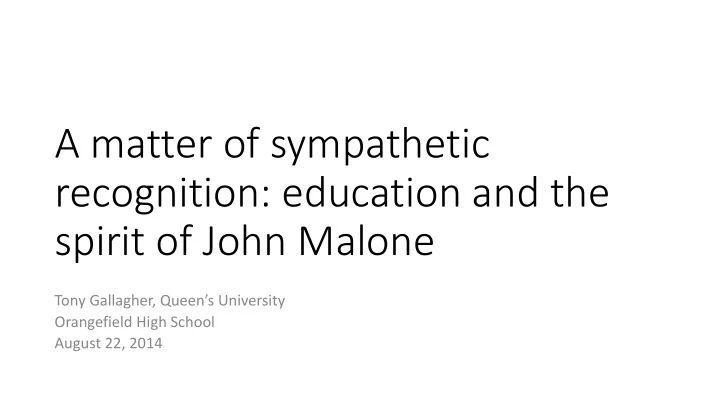

A matter of sympathetic recognition: education and the spirit of John Malone Tony Gallagher, Queen’s University Orangefield High School August 22, 2014
What people say about John Malone ‘… a man of vision, with great independence of mind.’ ‘… a liberal, progressive ‘… monastic dedication …’ school … like a 60s dream.’ ‘… missionary ‘… radical in ‘… quiet ‘… legendary.’ fervour …’ thought …’ sincerity …’
John Malone Memorial Lectures Education for renewal, Among schoolchildren, Why can't they be like us? Is comprehensive education Malcolm Skilbeck, 1982 Seamus Heaney, 1983 Maurice Hayes, 1984 still worth fighting for? Hugh Sockett, 1985 Dramatis Personae, Stewart Recollections, David Parker, 1986 Hammond, 1988
"The definition of insanity is doing the same thing over and over and expecting it to come out different"
1992/93 and 2012/13
Change in school types, 1992/93 and 2012/13 80 79 68 54 40 39 30 29 20 4 0 1 CONTROLLED MAINTAINED INTEGRATED IRISH MEDIUM CATHOLIC OTHER SECONDARY SECONDARY GRAMMAR GRAMMAR Number of schools in 1992/93 Number of schools in 2012/13
Change in secondary, 1992/93 & 2012/13 35 17 16 8 6 0 0 1 CONTROLLED MAINTAINED INTEGRATED IRISH MEDIUM Number of 1992/93 schools that are no longer open Number of 2012/13 schools that did not exist in 1992/93
Enrolment change, 1992/93 & 2012/13 10,552 541 1,976 3,116 -5,387 -10,930 CONTROLLED MAINTAINED INTEGRATED IRISH MEDIUM CATHOLIC OTHER SECONDARY SECONDARY GRAMMAR GRAMMAR
Performance change 1992/93 & 2012/13 % Year 12 pupils with 5+ good GCSEs 98 96 90 90 72 66 60 28 25 23 PROTESTANT CATHOLIC PROTESTANT CATHOLIC INTEGRATED GRAMMAR GRAMMAR SECONDARY SECONDARY SECONDARY 1992/93 2012/13
10 20 30 40 50 60 70 80 90 School performance 0 1963/64 1965/66 1967/68 1969/70 1971/72 1973/74 1975/76 1977/78 1981/82 1985/86 1987/88 1989/90 1991/92 1993/94 1995/96 1997/98 1999/00 2001/02 2003/04 2005/06 2007/08 2009/10 2011/12 Girls Boys
Community relations
Impact of interventions Positive potential Limited impact Common curriculum Language of a common Received curriculum not good; capacity to deal with the same as intended difference curriculum Contact programmes Promoting mutual Ephemeral; weak understanding & tolerance; theoretical understanding breaking down barriers of contact Common schools Promoting sense of a Assimilation; inconsistent common good; dealing practice; weakly connected with diversity sector; 7% Equal treatment of Recognising different Institutionalising separate schools identities; promoting equal difference; promoting silo opportunity society
Divided society or shared society?
Communities of learning
Mainstreaming shared education Positives Concerns • Programme for • Role of the Churches Government goals • Education authorities • Shared Campus • Shared Education programme becomes ‘ whatever you • Delivering Social Change want it to be’ • EU Peace IV Funds
Academic selection
100,000 120,000 140,000 160,000 Introducing selective education, 1949-1974 20,000 40,000 60,000 80,000 0 1949/50 1950/51 1951/52 1952/53 1953/54 1954/55 1955/56 1956/57 1957/58 1958/59 1959/60 1960/61 1961/62 1962/63 1963/64 1964/65 1965/66 1966/67 1967/68 1968/69 1969/70 1970/71 1971/72 1972/73 1973/74 1974/75 Primary (aged 12+) Secondary Technical Grammar
The end of academic selection? 1973 – Advisory Council on Education 1976 – Labour Direct Rule Minister 2000 – Burns Report 2002 – Minister of Education 2003 – Costello Report 2006 Education Order
Effects of the selective system (Gallagher and Smith, 2000) Disrupts primary school curriculum High variability in school performance Strong social background effects Divides pupils, teachers, parents
Lack of consensus = compromise or political impasse (select one)
Achievement gaps
-6 -4 -2 (school leavers with 5+ good GCSEs) Religious Achievement gap 0 2 4 6 1986/87 1987/88 1989/90 1990/91 1991/92 1992/93 1993/94 1994/95 1995/96 1996/97 1997/98 1998/99 1999/00 2000/01 2001/02 2002/03 2003/04 2004/05 2005/06 2006/07 2007/08 2008/09 2009/10 2010/11 2011/12 2012/13
Sector achievement gap – secondary schools (source: calculated from school performance tables) 80 70 % Year 12 with 5+ good GCSEs 60 50 40 30 20 Maintained average Controlled average
School performance, 2012/13, by sector % Year 12 with 5+ good GCSEs inc. Maths/English 100 % Year 12 with 5+ GCSEs inc English/Maths 75 50 25 0 0 10 20 30 40 50 60 70 FSME %
Social achievement gaps: grammar pupils, 2012/13 100 95 Percentage Year 12 pupils 90 85 80 75 5+ GCSEs 5+ GCSEs inc Maths/English 7+ GCSEs 7+ GCSEs inc Maths/English All pupils FSME
Social achievement gaps: secondary pupils, 2012/13 70 60 Percentage Year 12 pupils 50 40 30 20 5+ GCSEs 5+ GCSEs inc Maths/English 7+ GCSEs 7+ GCSEs inc Maths/English Not FSME FSME
Social achievement gaps: all pupils, 2012/13 80 70 Percentage Year 12 pupils 60 50 40 30 5+ GCSEs 5+ GCSEs inc Maths/English 7+ GCSEs 7+ GCSEs inc Maths/English All pupils FSME
Recommend
More recommend